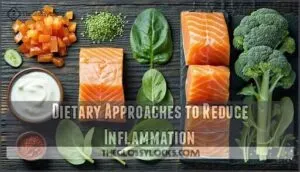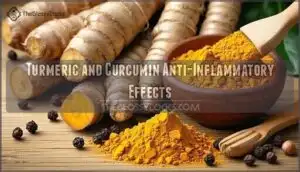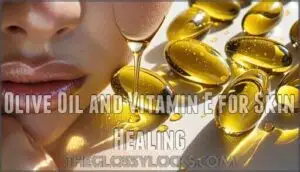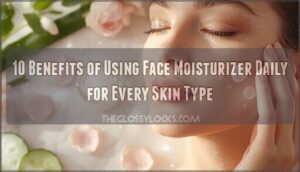This site is supported by our readers. We may earn a commission, at no cost to you, if you purchase through links.
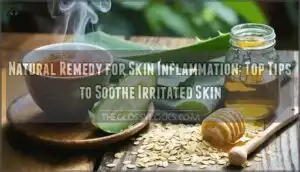
Aloe vera gel is a classic choice—it’s soothing, moisturizing, and might even help heal minor irritation.
Oats aren’t just for breakfast; they’re great for reducing redness and itching when added to a lukewarm bath.
Honey also has antibacterial and anti-inflammatory properties—apply a thin layer to irritated areas for relief.
Green tea’s antioxidants can reduce swelling, especially when used as a cooled toner.
Even small changes like ditching processed foods and sipping chamomile tea can make a difference.
Curious about more tips? Keep reading!
Table Of Contents
- Key Takeaways
- Natural Remedies Overview
- Dietary Approaches to Reduce Inflammation
- Herbal and Natural Remedies
- Topical Treatments for Skin Inflammation
- Lifestyle Changes for Reducing Inflammation
- Frequently Asked Questions (FAQs)
- What is the fastest way to reduce inflammation in the skin?
- What can I put on my skin to reduce inflammation?
- How I cured my inflammation naturally?
- What is the best natural topical anti-inflammatory?
- What are the best essential oils for inflammation?
- Can probiotics improve gut health for skin issues?
- How does stress impact inflammation in the body?
- Which teas are most effective for reducing redness?
- Are there specific fruits for rapid inflammation relief?
- Conclusion
Key Takeaways
- Try aloe vera gel to soothe inflammation, reduce redness, and promote faster healing.
- Use oatmeal baths to calm itchy, irritated skin and restore moisture naturally.
- Incorporate anti-inflammatory foods like leafy greens, omega-3-rich fish, and turmeric into your diet for better skin health from within.
- Manage stress with meditation and stay hydrated to support your skin’s healing and reduce flare-ups.
Natural Remedies Overview
When your skin feels irritated or inflamed, natural remedies can offer relief without relying on harsh chemicals.
Natural remedies soothe skin and heal inflammation, offering gentle relief free from harsh chemicals—nature’s answer to irritated skin.
Ingredients like Epsom salt, green tea, honey, oats, and aloe vera help soothe your skin and promote healing with their therapeutic properties.
Epsom Salt Benefits for Skin
Soaking in Epsom salt can work wonders for skin inflammation relief! Thanks to its Magnesium Absorption properties, it promotes Detoxification Benefits while soothing irritation.
You can also find products for exfoliation online.
- Exfoliation Recipes: Mix it with olive oil for smooth, glowing skin.
- Muscle Relaxation: Add a cup to your bath for instant calm.
- Bath Frequency: Aim for 1-2 relaxing soaks weekly. Total skin savior!
Green Tea Anti-Inflammatory Properties
Green tea, packed with epigallocatechin-3-gallate (EGCG), offers impressive anti-inflammatory and antioxidant benefits.
It calms irritated skin and can even assist with keratosis pilaris.
While not a replacement for broad-spectrum sunscreen, its natural properties add a protective edge.
For easy skin relief, try a green tea toner recipe by mixing cooled steeped tea, witch hazel, and optional rosewater—simple and effective!
Honey Antibacterial and Anti-Inflammatory Effects
Honey’s antibacterial and anti-inflammatory powers make it a go-to for skin inflammation.
If reactive skin’s your challenge, try Manuka honey; it speeds wound healing, hydrates dry patches, and battles acne.
Mix it with matcha or almond oil for a soothing mask. Blemishes don’t stand a chance, and your skin will thank you for this sweet, natural remedy.
Oats Soothing Properties for Irritated Skin
Feeling itchy or irritated? Oatmeal baths can calm sensitive skin with colloidal benefits. Process whole uncooked oats into a fine powder before adding them to warm water for eczema relief.
Calm sensitive skin naturally with oatmeal baths—colloidal benefits work like magic to soothe irritation and bring instant relief.
You’ll notice the water turning milky—it’s magic at work! Chamomile offers hydration and can further soothe sensitive skin.
Try these tips:
- Use colloidal oatmeal for even soothing.
- Stick to lukewarm bathwater.
- Soak 10–15 minutes.
- Pat dry—don’t rub!
- Hydrate post-bath to ensure your skin remains healthy and moisturized after the bath, and consider the additional soothing effects of sensitive skin care.
Aloe Vera Gel for Wound Healing and Skin Soothing
If oatmeal calms itchy skin, aloe vera gel steps in as nature’s first-aid kit.
Known for wound healing and skin soothing, it’s a staple for everything from insect bite relief to scar minimization.
Aloe sensitivity is rare, making it safe for kids too.
It’s often used for soothing sunburn relief.
Apply frequently to inflamed areas for natural remedies that keep your skin happy and irritation-free.
Dietary Approaches to Reduce Inflammation
What you eat can directly affect how your skin feels and looks, especially when it’s inflamed.
By focusing on anti-inflammatory foods like leafy greens, fatty fish, and probiotics, you can help calm irritation from the inside out, using probiotics to aid in this process.
Anti-Inflammatory Foods and Nutrients
Let’s talk about fueling your body with anti-inflammatory foods.
A balanced diet full of whole foods works wonders for skin inflammation.
Here’s your must-have list:
- Leafy greens like spinach for natural antioxidants.
- Omega-3 benefits with salmon and walnuts.
- Colorful fruits brimming with vitamins.
- Harness probiotic power from yogurt.
- Try anti-inflammatory spices like turmeric.
Importance of Omega-3 Fatty Acids
Omega-3 fatty acids play a big role in fighting inflammation and supporting skin health.
Found in fatty fish, flaxseeds, and walnuts, these omega-3 sources may reduce skin inflammation, support heart health, and boost brain function. If you’re low on natural options, supplements like fish oil can offer anti-inflammatory benefits.
Here’s a quick comparison of omega-3 sources:
| Source | Type | Benefit |
|---|---|---|
| Salmon | DHA, EPA | Reduces inflammation |
| Flaxseeds | ALA | Boosts skin hydration |
| Fish Oil | DHA, EPA | Supports heart and skin |
These sources provide essential nutrients for overall health, making omega-3 fatty acids a crucial part of a balanced diet.
Benefits of Leafy Greens and Fatty Fish
Pairing leafy greens and fatty fish is a powerhouse move for inflammation reduction.
Leafy vegetables like spinach and kale are packed with antioxidants, while omega-3-rich fatty fish, such as salmon or mackerel, calms inflammation at its core.
- Boosts heart and skin health
- Lowers inflammation naturally
- Strengthens immune response
- Rich in antiinflammatory nutrients
- Supports overall dietary impact
Role of Probiotic Foods in Reducing Inflammation
Leafy greens are fantastic, but don’t forget how probiotics can boost your immune system and gut-skin axis.
Fermented foods like yogurt, sauerkraut, and kombucha support microbiome diversity, calming inflammation through digestive health and immune modulation.
With specific strains reducing inflammatory markers, probiotics are game-changers among anti-inflammatory foods.
A happier gut often means happier skin—simple, right?
Regular consumption can also lead to anti-inflammatory effects, further benefiting skin health.
Impact of Refined Sugar and Processed Foods on Inflammation
Processed foods and refined sugar? They’re like lighting a fire in your body.
These inflammatory foods can disrupt your gut microbiome and trigger systemic inflammation.
Watch for these inflammation causes:
- Sugars’ Inflammatory Response: Fuels swelling and bloating.
- Insulin Resistance: Refined sugar stresses cells.
- Processed Foods Effects: Fake nutrients overload your system.
- Gut Microbiome Impact: Healthy bacteria don’t thrive.
Eat smart, feel better!
Herbal and Natural Remedies
When your skin flares up, simple herbal and natural remedies can offer relief without relying on harsh chemicals.
From turmeric’s powerful anti-inflammatory effects to soothing chamomile tea, these time-tested solutions help calm irritation and promote healing.
Turmeric and Curcumin Anti-Inflammatory Effects
Turmeric shines as a natural remedy for skin inflammation, thanks to curcumin’s powerful anti-inflammatory properties.
It works by blocking inflammation pathways, reducing redness, and soothing irritated skin.
Boost curcumin absorption by pairing turmeric with black pepper or healthy fats.
For skin conditions or joint pain, aim for dosage recommendations from trusted sources, or try a turmeric-infused mask for targeted relief.
Ginger and Cinnamon Anti-Inflammatory Properties
Ginger’s bioactives, like gingerol, and cinnamon’s cinnamaldehyde pack a punch against skin inflammation by blocking major inflammation pathways.
These spices team up in spice synergies, offering potent natural remedies.
A pinch in tea or food provides ideal dosage, soothing irritation, giving your skin a calm, warm hug from the inside out—no fancy products needed, it’s like a warm hug!
Chamomile and Jasmine Tea for Skin Soothing
Chamomile tea’s benefits shine in soothing skin irritation thanks to its natural anti-inflammatory properties.
Jasmine tea offers calming effects, making it a perfect natural skin soother.
To ease skin inflammation, try these tips:
- Brew chamomile tea, cool it, and use as a skin rinse.
- Apply tea bags as a topical soothing compress.
- Combine jasmine tea with aloe vera gel.
- Mist cooled chamomile tea as a toner.
- Soak in jasmine-infused bathwater for relaxation.
Arnica and German Chamomile for Topical Inflammation Treatment
Chamomile tea calms inflammation, but when paired with arnica, you’ve got herbal synergy for bruises and swelling.
German chamomile helps soothe while reducing redness. Arnica steps in with anti-inflammatory powers for topical use, like gels or lotions.
For bruising specifically, consider arnica gel products. Never ingest arnica—it’s toxic!
Here’s how they stack up:
| Remedy | Benefits | Application Methods |
|---|---|---|
| Arnica | Reduces bruising | Use diluted, topically |
| Chamomile | Soothes redness | Compress or tea bags |
The combination of chamomile and arnica provides a powerful remedy for inflammation and bruising, making them a great pair for natural healing.
Olive Oil and Vitamin E for Skin Healing
Arnica works wonders, but don’t overlook olive oil and vitamin E in terms of skin healing.
They’re all-stars for calming inflammation, speeding up the wound healing process, and minimizing scars.
Apply olive oil directly for deep hydration or combine with vitamin E for enhanced benefits.
Vitamin E also offers antioxidant properties explained, which helps protect against skin damage.
- Hydrates and softens irritated skin gently.
- Encourages scar reduction naturally.
- Supports your skin’s barrier for faster recovery.
Topical Treatments for Skin Inflammation
When your skin is inflamed, simple topical treatments can provide quick, soothing relief.
From cooling compresses to natural remedies like aloe vera or green tea, these methods help calm irritation while supporting your skin’s healing process, which can include using natural remedies.
Cold Compress for Instant Relief
When skin inflammation has you feeling like you’re wearing a sunburn sweater, a cold compress offers quick relief.
Damp cloths or ice packs reduce redness and swelling by slowing blood flow.
Apply 10 minutes, 3-4 times daily.
Avoid direct ice—your skin isn’t a science experiment.
For inflamed areas, it’s one of the safest natural remedies to cool down effectively and provide quick relief.
Apple Cider Vinegar for Balancing Skin Acidity
Apple cider vinegar (ACV) is a natural remedy for managing skin acidity and inflammation.
Its acetic acid can help restore your skin’s pH balance when properly diluted.
For eczema treatment, add 2 cups of ACV to a warm bath or use as a toner—always dilute it first to avoid ACV side-effects like irritation or dryness.
The malic acid properties in ACV can also help exfoliate dead skin cells.
Aloe Vera Gel for Skin Soothing and Moisturizing
Life’s irritations don’t stand a chance against aloe vera gel. It’s a soothing skin lotion that reduces inflammation and speeds up healing.
Extract the jelly-like goodness straight from an aloe plant or grab a store-bought version. Remember to perform aloe sensitivity testing first.
Benefits include:
- Natural remedies for inflammation relief
- Skin healing and scar reduction
- Hydration boost
- Aloe application methods
- Lightweight, non-greasy formula, which makes it an excellent choice for inflammation relief.
Epsom Salt Baths for Skin Barrier Function and Moisture Retention
If your skin’s crying out for relief, Epsom salt baths might be your answer.
With magnesium absorption rates that support hydration and strengthen the skin barrier, they reduce skin inflammation while moisturizing.
Stick to warm bath temperature effects—overheating can dry you out.
Add one cup Epsom salt to the tub and enjoy soft, soothed skin. Try a DIY Epsom scrub too!
Green Tea Toner for Anti-Inflammatory and Antioxidant Benefits
After soaking in Epsom salts, why not try green tea toner for anti-inflammatory skincare? Brewed green tea, rich in antioxidant properties, pairs perfectly with witch hazel benefits and a splash of rosewater addition for soothing irritated skin.
As a result, it can also balance skin’s pH, preventing breakouts and irritation. Apply this toner gently with a cotton pad.
Keep your mixture fresh—store it refrigerated, and enjoy up to 14 days of cool, calming relief!
Lifestyle Changes for Reducing Inflammation
You can soothe irritated skin by making simple changes to your daily routine.
Regular exercise, stress management, and healthy habits like staying hydrated and well-rested work together to reduce inflammation from the inside out, which can help with irritated skin and promote overall wellness by being well-rested.
Importance of Daily Exercise and Weight Management
Getting moving isn’t just for fitness—it’s a game-changer for your skin.
Regular exercise boosts blood flow, oxygenating cells for a healthy glow.
Weight loss can improve inflammation management while keeping stress hormones in check, which helps reduce breakouts.
Think of physical activity as a natural skin helper—just one more reason to lace up those sneakers and get active to improve your overall well-being!
Role of Stress Management and Meditation
Under stress, your body produces cortisol, which worsens skin inflammation.
Meditation techniques, like deep breathing or visualization, can help reduce cortisol levels and enhance emotional wellbeing.
Try mindfulness benefits by focusing on the present moment—it’s like hitting pause on chaos.
Embrace stress management as a natural remedy to support your skin’s healing journey and overall inflammation control.
Benefits of Quitting Smoking and Limiting Alcohol Consumption
Smoking’s skin impact worsens inflammation, speeds aging, and restricts healing.
Alcohol’s inflammatory effects harm liver health and promote cellular damage.
Quitting alcohol can also improve essential nutrient absorption.
Ready for a change? Try these five steps:
- Limit alcohol to one drink daily.
- Cut smoking gradually or seek support.
- Focus on overall wellness via an anti-inflammatory diet.
- Replace social triggers with fun hobbies.
- Celebrate milestones—you’re transforming with a new lifestyle, improving your health, and gaining confidence.
Importance of Getting Enough Sleep and Staying Hydrated
Lack of sleep and dehydration can worsen skin inflammation by impairing cellular repair and toxin removal.
Sleep deprivation slows recovery, while low hydration levels leave skin dry and irritated.
Aim for sufficient sleep nightly—your skin heals best while you rest.
Keep water intake up; hydration isn’t just essential for skin health, it’s one of the simplest skin inflammation remedies out there, providing a key to skin health.
Impact of Dietary Changes on Reducing Skin Inflammation
By embracing an anti-inflammatory diet, you can calm skin irritation from the inside out.
Focus on leafy greens, fatty fish, and whole grains while minimizing inflammatory foods like processed snacks and added sugars.
Don’t underestimate gut health—fermented foods can work wonders for inflammation.
Plus, staying hydrated flushes toxins, giving your skin that glow. Small dietary changes, big results!
Frequently Asked Questions (FAQs)
What is the fastest way to reduce inflammation in the skin?
Think of heat and swelling like an overflowing cup—cool it down fast with a cold compress.
Gently apply for 15 minutes, then moisturize with aloe vera gel to soothe and hydrate inflamed skin.
What can I put on my skin to reduce inflammation?
Apply aloe vera gel to soothe irritation, reduce redness, and promote healing.
Honey’s antibacterial and anti-inflammatory properties also work wonders.
For extra relief, try a cold compress or oatmeal paste—it’s like comfort food for your skin!
How I cured my inflammation naturally?
You can calm inflammation naturally by soaking in an Epsom salt bath, applying aloe vera gel, and using green tea toner.
Pair this with an anti-inflammatory diet including leafy greens, omega-3s, and turmeric.
What is the best natural topical anti-inflammatory?
Aloe vera gel is like a gentle hug for inflamed skin, soothing irritation naturally.
Its antibacterial and healing properties make it a top pick—just test a small amount first to verify it suits you.
What are the best essential oils for inflammation?
Peppermint, lavender, chamomile, and eucalyptus essential oils can soothe inflammation naturally.
Their anti-inflammatory and calming properties ease discomfort, promote healing, and reduce swelling.
Always dilute with a carrier oil before applying to avoid irritation.
Can probiotics improve gut health for skin issues?
Probiotics can improve gut health, which often connects to skin issues like acne or eczema.
By balancing your gut microbiome, they reduce inflammation, boost immunity, and promote clearer, healthier skin—your stomach and face will thank you!
How does stress impact inflammation in the body?
Chronic stress raises inflammation by increasing cortisol, which, ironically, loses its anti-inflammatory effects over time.
Your body might feel under attack, triggering flare-ups.
Think of it as your immune system overreacting to life’s daily challenges.
Which teas are most effective for reducing redness?
Chamomile and green tea work wonders for reducing redness.
Both calm inflammation while providing antioxidant benefits.
Brew them, cool the tea, and apply it with a cloth—it’s like a mini spa day for irritated skin!
Are there specific fruits for rapid inflammation relief?
You might think fruits can’t help quickly, but try pineapple and cherries.
Bromelain in pineapple fights swelling, while cherries pack antioxidants to ease redness.
Toss them into snacks—they’re nature’s sweet anti-inflammatory superheroes!
Conclusion
Picture your skin as a delicate canvas, craving care and balance.
By embracing these natural remedies for skin inflammation, you can calm redness, soothe irritation, and promote healing.
From aloe vera’s cooling touch to oats’ comforting properties, these simple solutions work wonders.
Don’t forget, small dietary tweaks like adding omega-3s or sipping chamomile tea can boost results.
With thoughtful care and consistency, you’ll help your skin regain its healthy glow while protecting it from future flare-ups.


